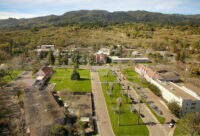“Like looking for a polar bear in a snowstorm.”
That’s the metaphor that breast surgeon Charles Elboim used on April 25 to describe what it’s like to use the Sonoma Valley Hospital’s current film-based mammography machine to view tumors inside a younger woman’s breast tissue.
Elboim was making a pitch to the hospital board to buy a new, digital mammography machine for roughly $550,000 – which the board agreed to do by a 4-0 vote.
“It’s a much more sophisticated way of looking at images,” Elboim said of the digital machine.
Pre-menopausal and many post-menopausal women have dense, white breast tissue, Elboim told the board. Tumors also are white. Hence the polar-bear-in-a-snowstorm analogy.
But tumors show up better on a digital machine, and computer algorithms and software help find tumors on digital machines, he said.
Other benefits cited by Elboim include the ease of handling digital images as opposed to film.
“You can archive the images digitally. You can send it… anywhere in the world,” Elboim said. “It is the wave of the future. Digital is coming in big-time.”
Daryl Chin, Sonoma Valley Hospital staff radiologist, told the board that the new machine would emit radiation equivalent to the amount of three months of “background” radiation that a person receives going about his or her normal life.
The hospital’s current mammography machine is still useful for older women with fatty replacement of breast tissue, Elboim said.
Dozens of people have contributed to buy the new machine, including Bob and Carolyon Stone, said hospital spokesman Scott Gregerson. The machine should be operational by late summer, he said.
Cirrus calls it quits
Staff Report
Cirrus Health Group, the Dallas, Texas-based company that bought the option on 22 acres on Eighth Street East and Napa Road where it proposed to spend $100 million on a for-profit Sonoma hospital, along with an adjacent luxury medical spa, has withdrawn its proposal. That came after its latest overture to the hospital board was rejected by a 2-2 vote on the night of April 25.
John Thomas, president of Cirrus Health Group, said on April 27, “Despite Cirrus’ good faith efforts in proposing at least seven different possible structures for a public-private partnership to provide a 21st-century hospital and medical campus, the board has concluded Cirrus is neither welcome nor necessary.”
A private-public “hybrid” option was put forth in a resolution made on April 25 by recently appointed hospital board member Bill Boerum. His resolution would have directed Carl Gerlach, the hospital’s chief executive officer, to negotiate with Cirrus.
At the board meeting, Gerlach identified a number of possible benefits from “a partner like Cirrus.” He also discussed several potential negatives of the proposed negotiations, including a big delay if the partnership option were selected but the urban-growth boundary amendment was not approved by city of Sonoma voters.
About a dozen people spoke at the April 25 board meeting, prior to the board’s vote.
Steve Kyle said that it was the board’s fiduciary responsibility to negotiate and if board members didn’t, “You will have done a disservice to the community.”
Citing bad experiences in their earlier discussions with Cirrus, hospital board members Mike Nugent and Arnie Riebli both voted against Boerum’s resolution.
“I’m going to vote no,” Riebli said, allowing that he was still “not opposed to listening to what they have to say.”
Nugent said, “I have heard so much legal argle-bargle from Cirrus.” With board member Mike Smith absent, the tie vote meant that Boerum’s resolution failed.
Henry Grause, the developer of the proposed medical spa on the Cirrus hospital site, said on April 26 that Cirrus was only 50 votes short of getting enough signatures put its urban-growth boundary proposal on the ballot in August.
Meanwhile, Cirrus opponent Larry Barnett said, “I am delighted to hear of Cirrus’ decision. It’s probably the best business decision they have made all year. The proposed UGB expansion would have gone down to a resounding defeat.”




